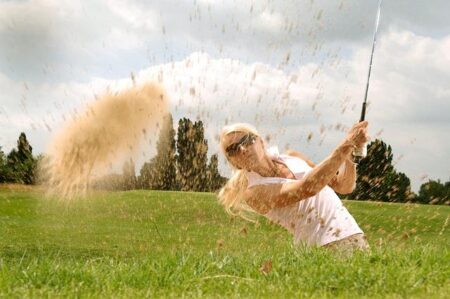The Cure for Your ŌĆŹFirst Tee Jitters: NavigatingŌüŻ nerves ŌĆŹon the golf Course
As ŌĆŗthe sun rises on a crisp morning, golfers around the world prepare to take their first Ōüżswings of the dayŌĆöan endeavor thatŌĆŗ can bring joy, camaraderie, adn, forŌüŻ many, aŌĆŗ wave ofŌĆŹ anxiety. The first tee is oftenŌĆŹ aŌüŻ crucible of emotions, where excitement meets trepidation, leading to whatŌüó many playersŌüż affectionately term ŌĆ£first tee jitters.ŌĆØŌĆŗ ThisŌüż universal phenomenon affects ŌĆŹseasonedŌüŻ players and ŌĆŗnovices alike, turning a simple gameŌĆŹ intoŌüó a high-pressureŌĆŹ situation. In ŌĆŗthis article, we will explore the causes ŌĆŹbehind these ŌüŻnerves, theŌüż psychological impactsŌĆŗ of performance anxiety, and expert strategies to Ōüóhelp golfers transformŌüó their apprehension into confidence. WhetherŌüŻ youŌĆÖre aŌĆŹ weekend warrior or an ŌĆŹaspiring pro, understanding and overcomingŌĆŗ first tee jittersŌüż can unlock ŌĆŹyour true potential on ŌĆīthe course.Join us as ŌĆŹwe delve intoŌüó the science of sports psychology and ŌĆŗshare Ōüópractical tips ŌĆŹto ensure your firstŌĆī swing isŌĆī not just the Ōüżbeginning of a round,but the Ōüżstart of a Ōüógratifying ŌĆŹjourney on the green.
Understanding the Psychological triggers behind first Tee ŌüŻAnxiety
First tee anxiety isŌĆŗ a common experience that ŌĆīmany golfers face, often causing themŌüó to overthink ŌĆŹtheirŌüó performance during one of the sport’s most crucial Ōüżmoments. ThisŌüż phenomenon isŌĆŹ primarily drivenŌĆŗ byŌüŻ a seriesŌüŻ ofŌĆŗ psychological triggers, including heightened self-awarenessŌüó and the fear ofŌüż judgment.Ōüó Golf,ŌĆī as ŌüŻan individual sport, places the player in aŌĆŗ spotlightŌĆī whereŌüż every swing is ŌüŻscrutinizedŌĆŗ by both peers and onlookers.ŌüŻ ThisŌüó pressure can lead to a vicious cycle of ŌĆŗnegative thoughts, hindering focus and consequently ŌĆŗimpacting performance.
Understanding ŌüótheseŌĆŗ psychological triggers canŌüŻ pave the way ŌĆŹfor effective coping strategies. Individuals ŌĆīexperiencing anxietyŌĆŗ may ŌüŻbenefitŌĆī fromŌĆŹ recognizing their thoughtŌüż patterns and implementingŌĆī strategies such as:
- Visualization: Imagining a ŌĆŹtriumphant first teeŌüŻ shot can help rewire negative thought ŌĆŹprocesses.
- breathing Techniques: Simple deep-breathing exercisesŌĆŹ canŌüż foster relaxation and alleviate tension.
- Positive Affirmations: Repeating ŌĆŗaffirmationsŌĆŹ can build confidence and reduce anxietyŌĆŗ levels.
- Mindfulness Practices: ŌüŻStaying presentŌĆŗ and focusing ŌüŻon the moment rather thanŌĆŗ potential outcomes can enhance performance.
| Trigger | Effect | Counter Strategy |
|---|---|---|
| Self-awareness | Heightened ŌĆŗpressure to perform | Visualization |
| Fear ŌüŻof judgment | Increased anxiety | Positive affirmations |
| Performance expectations | Negative self-talk | MindfulnessŌĆŗ practices |
Effective StrategiesŌĆŗ to Overcome Pre-Round Nerves and Boost Confidence
Approaching the first Ōüżhole canŌĆŗ feel likeŌĆŗ stepping onto ŌüŻa stage ŌüŻbefore a live ŌĆŗaudience. To transform this anxiety ŌĆŗintoŌüó excitement, ŌĆŗconsider visualizing your success ŌĆŗbefore youŌüó even pick ŌüŻup ŌüótheŌüó club. ŌüŻ Mental imagery allows you ŌĆŹto imagine Ōüżstriking the ball perfectly,ŌĆŹ and this positive reinforcement can significantly enhance your confidence. ŌüżIn addition,ŌĆŗ establishing a consistent pre-game routine, similar to athletesŌĆŗ in other sports, ŌĆŹcan help ground your mind and body. simple ŌĆīactions likeŌüó stretching, practicingŌüż swings, or just ŌĆŗtaking deep breaths can ease theŌüó tension ŌĆŗand Ōüóset a ŌĆŹfocused ŌĆŗmindset.
A supportiveŌĆŗ habitat also plays ŌüŻa crucial role Ōüóin Ōüómanaging Ōüżnerves. Surround yourself with fellowŌüó golfers who encourage Ōüórather thanŌĆŹ criticize.ŌüŻ Sharing your jitters with your playing partners canŌĆŗ lighten the mood ŌĆŗand ŌĆīcreate Ōüża sense of camaraderie. Moreover, leveraging affirmations can ŌüóserveŌüŻ asŌüó a ŌĆīpowerful tool; repeating phrases likeŌĆī “I am prepared” or “I playŌüŻ for ŌüŻenjoyment” can reinforce your Ōüżresilience.Engaging inŌüŻ group practiceŌüó sessions can also be beneficial,as the camaraderie fosters a more relaxed atmosphere and diminishes the pressure of competition.
The Conclusion
As we conclude our exploration of strategies to Ōüżconquer ŌüŻfirstŌĆī tee jitters, it is clear that ŌĆŗtheŌüó interplay ŌĆŹof mentalŌĆŗ planning, technique, and routine can transform apprehension intoŌĆŗ confidence. ŌüżWhether ŌüżyouŌĆÖre aŌĆŹ seasoned ŌĆŗplayer or ŌĆŗnew to ŌĆŹthe game,ŌĆŗ embracing these tools ŌĆŗcan enhance ŌĆīyour performance and enjoyment on the course. Remember, the key lies inŌüó practice and positivity; by applying these insights, golfers of all levels can find calm amidstŌüż the excitement of their firstŌüż swing. ŌĆŗWith the rightŌüó mindset, theŌĆŹ first tee ŌĆŗcan becomeŌĆŹ notŌĆī just aŌüó challenge, Ōüżbut a gateway toŌĆŗ a rewarding round and a reaffirmation of oneŌĆÖs love for the game. ŌüŻAs you step up to the tee nextŌüż time,Ōüó letŌĆī the ŌĆŗexcitement of the challenge aheadŌüó drown out the nerves ŌĆŹand Ōüżremember that ŌĆīevery ŌĆŗgreat golfer was once a beginner.








